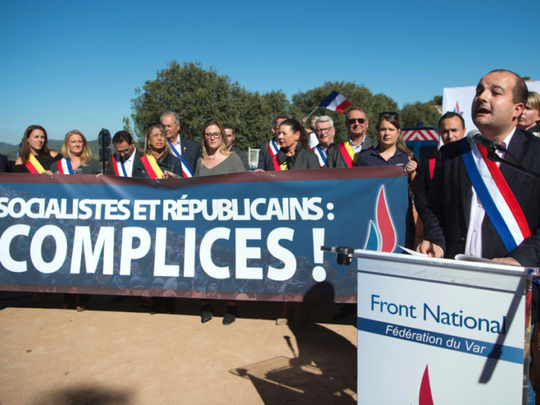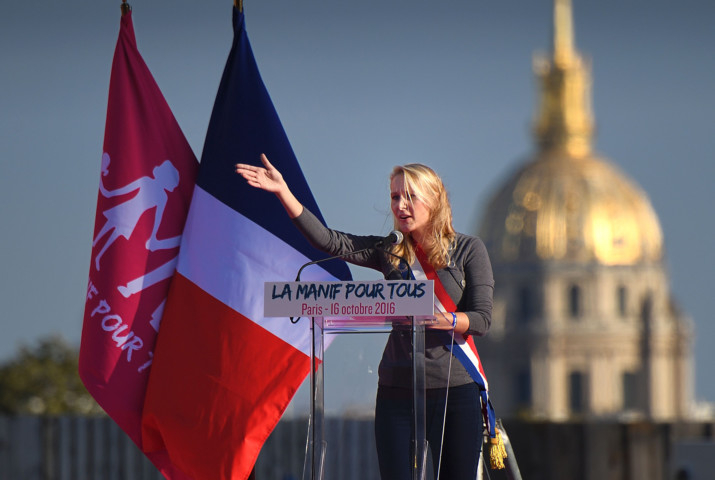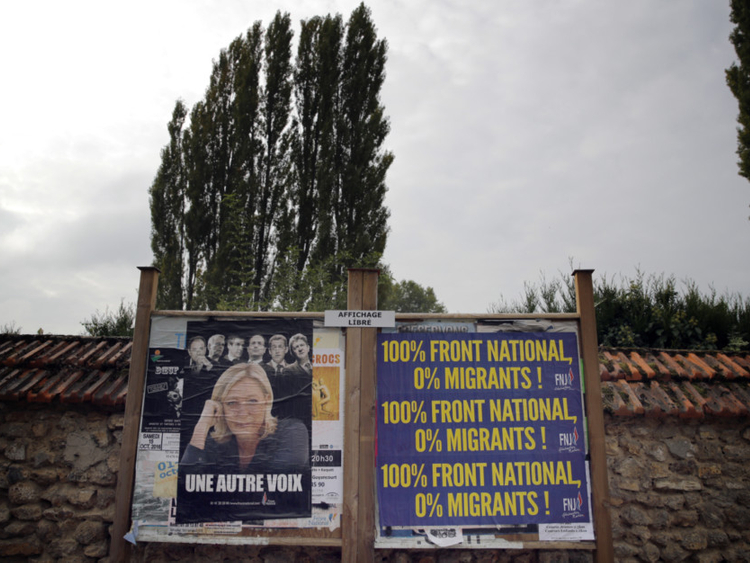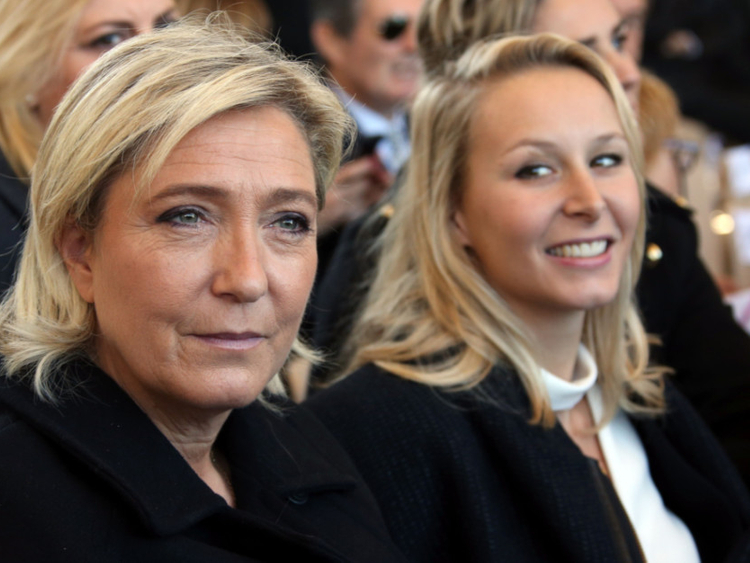
It’s not easy being a teenage member of the National Front.
“Some people close the doors on you,” said Justine Dieulafait, an 18-year-old law student with a gentle manner and a fierce belief that France has no more room for immigrants. “You just have to accept it.”
But in Fréjus, a tranquil beach resort in southern France, Dieulafait was among her people.
Home to 50,000 people, the town is the biggest municipality under the control of the hard-right National Front (FN). As such, it was the perfect place to host last month’s “back-to-school” gathering of the party faithful in a former airplane hangar by the palm-fringed coast.
Most of the conference attendees — waving tricolour flags and sporting “Proud to be French” baseball caps — were middle-aged, a reflection of the party’s core demographic. Yet party leader Marine Le Pen, flanked onstage by a chorus of young women as she sang the national anthem, has also been pitching the FN as the party of choice for alienated French 20-somethings — and the pitch appears to be working.
Hundreds of young people have been elected to local office under her leadership since 2011, and some of the FN’s best-known faces have yet to turn 30. Le Pen’s 26-year-old niece, Marion Marchal-Le Pen, the blonde bombshell of the far right, is France’s youngest MP. And then there is David Rachline, a senator and the mayor of Fréjus, who at 28 has just been named Le Pen’s presidential campaign chief.
At the conference, smartly dressed, articulate young activists were among those pushing Le Pen’s message most fervently. They hammered home the dangers of multiculturalism and Muslims who “segregate” themselves from secular French society; they pronounced themselves enthusiastically in favour of a “Frexit” from the European Union. Like Dieulafait, who joined the FN at 16, they want a government that puts French citizens’ needs before those of immigrants, and they are not ashamed to say so.
If Le Pen wins next year’s presidential elections — a prospect that remains unlikely but not impossible — it will be thanks in part to a growing army of young supporters.
Analysts stress the huge abstention rates among young voters unenthused by any of the political options on offer — 65 per cent of young people did not vote in the last regional elections, according to Ipsos estimates. Yet of those aged 18 to 24 who do intend to vote, Le Pen ranks in surveys as the preferred president. In the first round of December’s regional polls, 35 per cent of them backed the FN, according to the Ipsos study, when the national average was 28 per cent. The ruling Socialists and main opposition Republicans, by comparison, garnered only 21 per cent of the youth vote each.
In the context of other recent populist movements, it may seem surprising that the FN, an anti-EU party that is calling for an abrupt halt to immigration, has earned the backing of so many young French people. It was young British voters, for instance, who turned out in droves in June to back an open, cosmopolitan vision of the European Union. In the United States, Donald Trump’s nationalist presidential campaign has struggled with so-called millennials.
But in France, young people are particularly afflicted by the economic and cultural insecurity that tends to motivate populism. A quarter of people under 24 are unemployed in France, and for the rest it is common to survive on precarious short-term job contracts, a far cry from the cast-iron security enjoyed by their parents and grandparents.
“What has François Hollande done for young people? He has handed us a totally uncertain future,” said Dieulafait’s friend Antoine Kieffer, a 19-year-old entrepreneur.
The FN may still be hated by a large proportion of moderate France, but it is more socially acceptable than ever, with a steady stream of electoral gains to prove it. It helps that Le Pen’s new young supporters came of political age after her efforts to sanitise the party’s image, and distance it from the stereotype of anti-Semitic thugs associated with the version of the FN founded by her father, Jean-Marie, in 1972.
“You have to be over 40 for the frontist agenda not to seem like ordinary politics,” said political scientist Stephane Wahnich, who has co-written two books about the FN. “It’s older people who draw a link more easily with an extreme, Nazi-type or fascist ideology.”
But the FN’s greatest strength may be the open ambition of its youngest voters and candidates — and the apathy of the rest of its generational cohort, who are increasingly giving up on politics altogether. If the party’s young voters and candidates achieve their goal of running the country within the next decade or two, Wahnich says, it will be because they won “through indifference”.
Balding and portly, Le Pen’s campaign chief could pass for a decade older than his 28 years. A rakish knitted tie and a reputation among activists as a party animal are the only clues to David Rachline’s actual age.
Rachline has been a member of the FN since he was 15, and mayor of Fréjus since he was 26. He is not surprised that young people are being drawn to the party; only the FN, he says, can bring real change to the ossified world of French politics.
“It has dawned on [young voters] that the political system designed 40 years ago has brought them precarity, insecurity, and mass unemployment,” Rachline said on the conference sidelines. “They are looking for another way, and we are offering another way — to get the country back up and running, and to get the daily life of young French people up and running again, too.”
The young mayor’s management of the town gets largely good reviews from residents, even those who didn’t vote for him. The streets and parks are a bit tidier, they say. He has knocked $22 million (Dh80.8 million) off the $168 million debt he inherited from his predecessor without raising taxes, partly by selling off land to developers. Le Pen holds up his town as an example of the FN’s ability to govern sensibly when given the chance.
Yet not everyone is a fan. Rachline was one of dozens of French mayors who moved to ban the “burkini” swimsuit from their municipalities this summer. While the move was popular among his constituents, there were those in the town, local young left-wingers among them, who thought it either a pointless move or a dangerous one. “He’s a fascist,” said 26-year-old osteopath Estelle, sipping a beer in the tranquil main square.
Once the domain of Jean-Marie Le Pen, Rachline’s native Riviera has long been part of the FN heartland, thanks in part to the tens of thousands of staunchly nationalist “pieds-noirs” — longtime French expats who lived in Algeria before independence — who made the region their home. With its pastel-coloured houses and sun-soaked squares, well-to-do Fréjus is worlds away from the depressed, post-industrial north where the party has managed to ride mass unemployment to huge gains in support.
In the south, analysts attribute the strength of the FN vote to deep social conservatism and bad experiences with local governments run by the mainstream right, rather than economic misery. Across the nation, FN membership tends to run in the family; about 80 per cent of party activists aged 14 to 32 have parents who share their views, according to a study by the Fondation Jean-Jaurs, a left-leaning think-tank.
For Wahnich, this strong tendency to vote in line with one’s parents means that Le Pen’s efforts to woo more mainstream middle-aged voters have had a trickle-down effect for the young. “You have a reproduction of the family vote amongst young Frontist voters,” he said. The young are watching as Le Pen wins over their frustrated parents with a promise of a France for the French, in control of its borders, its currency, its destiny. In many cases, Wahnich said, they are simply following their parents’ lead.
But on some issues, Le Pen’s message is striking a chord with young voters in particular. A study by the Institut Diderot think-tank published last November found that 18- to 24-year-olds were more likely than the average adult to believe that a President Marine Le Pen would be a force for good on three major issues for voters: security, immigration and jobs. On the first two issues the difference was by a mere percentage point or two. But on employment the difference was more stark: 27 per cent of the young said Le Pen would create more jobs, compared with 21 per cent of adults at large.
In four years Hollande has done little to bring the youth unemployment rate down from 1 in 4; France’s famously rigid labour regulations have not encouraged businesses to take on young full-time staff at a time of gloomy forecasts. Jean-Yves Camus, who runs the radical politics unit at the Fondation Jean-Jaurs, believes the “anti-system dimension” of the FN is particularly attractive to the young; they are asking themselves if Le Pen would be less afraid than an establishment president to challenge a status quo that is clearly not working for them. Touting an exit from the EU and a return to the franc, along with promises to protect industry from the ravages of globalisation, her policy prescriptions are more drastic than those of her rivals.
“People have been waiting for politicians who will act. The National Front is responding to this demand and seems to be alone in doing so,” said Enguerrand Delannoy, a young councillor for the Republicans, France’s mainstream centre-right party, in the Diderot study.
Conversations with young delegates at the party conference in Fréjus — students, entrepreneurs, police officers, takeaway delivery drivers — revealed deep concerns about unemployment, immigration and joblessness. But they also reflected a worldview where these are not separate problems but interlinked parts of a broader systemic malaise. Halting immigration would create more jobs for those born in France, they insisted. And in the context of the recent terror attacks, the migrant crisis, and anxieties that France’s Muslim community is badly integrated, they drew an inextricable link between immigration and security.
If young FN activists tend to throw around the same buzzwords — “self-determination”, “economic patriotism” — there is room for interpretation among them about what these mean and which need to be prioritised.
Some, like Kieffer, the 19-year-old entrepreneur, who is from Brittany, are more focused on the need to quit the EU and strip back regulations; he is convinced this would be better for the agribusiness he has just set up. “When it comes to [the need for] economic protectionism and leaving the EU, the status quo is idiotic,” he said.
And some, but by no means all, are in the party because they are unabashed social conservatives. Marion Marchal-Le Pen is the poster girl for this proudly Catholic end of the party, young and old alike; she is a good deal more right-wing on social issues than her aunt, flatly rejecting gay marriage while Marine has backed civil partnerships.
The older Le Pen may be focusing her pre-election campaign on vilifying Brussels in a bid to attract mainstream votes, but she is wily enough to know that her niece represents a core FN constituency that wants to keep the focus on protecting French identity. Glossy photographs of the dynasty’s newest member jostled prominently for sale with those of her aunt at the party conference in Fréjus, while her penchant for stunts like joining the military reservists and appealing to “young patriots” like herself to do the same have brought a little vigour to the party. Both her youth and her conservatism have made her the golden child of the new FN era.
All young activists in Fréjus agreed on the need for France to reclaim its identity.
“There is a common idea that unites us: We believe in France,” said David Berton, a bespectacled 24-year-old who serves as the FN’s youth coordinator in the Auvergne-Rhone-Alpes region. “For us, 1,500 years of history isn’t nothing.”
He and his friends appeared to take comfort in an idea of France rooted in a romanticised past. When so much around them is uncertain, analysts say, it is not surprising that young French people are grasping for solid identities. Nationalism is an obvious option.
Wahnich notes that the young have faced a particular struggle in trying to understand the recent surge in homegrown French terrorism; it is men from their own generation who gunned down and blew up 130 people enjoying a night out in Paris last November, and a couple of 19-year-olds who slit the throat of a Normandy priest this summer in the name of the Islamic Front.
“What worries me is this rise in tension between increasingly nationalist young people on one side and an Islamised youth on the other,” Wahnich said. He does not believe it bodes well for a united France 10 years down the line.
The FN has shown its willingness to give 20-somethings a chance at running for office, making it a natural home for the ambitious young right-winger. A fifth of its local councillors are under the age of 34, according to party figures. That’s compared with just 8 per cent of the Republicans’ councillors and 13 per cent of councillors on the left.
“The FN gives a key role to young people in a pretty unique way. We have trust in them,” Marchal-Le Pen said backstage in Fréjus. “If they want to come to the FN, they will not be mere extras. If they have the capacities, they will have the chance to run for office, to truly work for their country.”
For Damien Monchau, a FN councillor with a hipster beard and a day job as a riot policeman, part of the party’s appeal is that it seems more accessible for budding politicians who don’t come from privileged families.
Within the Republicans and Socialists, the 30-year-old said, major party roles were “reserved for apparatchiks who’ve been there for 40 years who come systematically from the same schools, the same families, the same backgrounds, the same networks”.
In general, young party activists in Fréjus seemed determined to convince us that the FN could be a party for all in France, including citizens descended from immigrants. If the current crop remains overwhelmingly white, the party’s make-up is slowly changing.
Rachline’s late father was Jewish, helping Le Pen shed her party’s image as a home for anti-Semites. And Berton, the FN youth coordinator, pointedly introduced us to a group of activists that included a young man of Moroccan origin and a young woman born in Mauritius. If young people of colour like Kevin Naamane and Marie-France Passavant become more than just token members in the years to come, the FN of the future could be a very different party.
Naamane’s grandparents came to France decades ago as Moroccan immigrants. A 22-year-old One Direction look-alike with ear piercings on both sides, he has zipped through a couple of speedy political conversions of late, spending a few months with the Communist Party before settling on the FN.
“My family is a perfect example of assimilation,” he said proudly. “The only difference is between being French or being foreign.”
Thirty-year-old Passavant, Mauritian by birth, was a little apprehensive at first about the reaction she would receive from grassroots members when she turned up at a party meeting in 2013. “I’m adopted; my mother is blonde with blue eyes, and I’ve always lived through the difference in colour,” she said. But she said she was welcomed to the FN with open arms. “If it was a racist party, I wouldn’t be here.”
Now, it is at family gatherings where she receives a frosty reception. She grew up in a leftist household, and she’s had to make tough choices. Her blonde, blue-eyed family doesn’t understand why she would join the party that is still so widely hated, she said.
“Several times, when I’ve had to choose between my political career and my family,” Passavant said, “I’ve chosen the FN.”
–Washington Post
Claire Sergent is a freelance journalist working for Euronews and other media in France. Katy Lee is a journalist with Agence France Presse in Paris.















